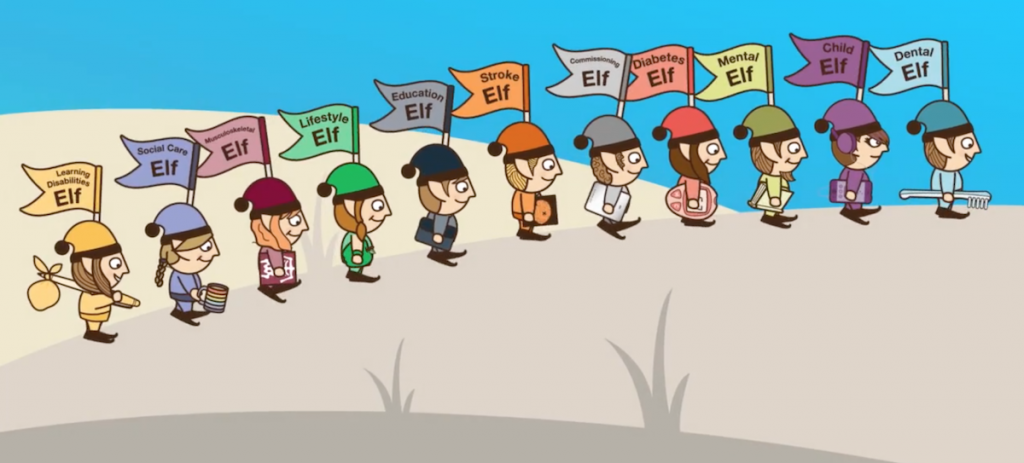
Social care and health practitioners and providers, service users and carers are inundated with new evidence. They can’t keep up to date, yet they are required to for professional or service development, practice and planning purposes.
Our new National Elf Service tackles this problem in a unique way. Created by professionals for professionals, it summarises high quality new evidence that is relevant to practice using industry-standard appraisal criteria and an accessible and user-friendly front-end.
The service also features open and transparent discussion of the evidence, bringing together practitioners, providers, service users, carers and researchers. Practitioners who use the National Elf Service can track their learning as they engage with the evidence using the service’s curated content and continuing professional development tools.
No other service works in this way. Our mantra is:
- No bias
- No misinformation
- No spin
- Just what you need!
The National Elf Service aims to improve social care practice by making it easier for everyone to engage with the best evidence.
First to be launched in the National Elf Service series last month (May 2015) was the Mental Elf. Today we see two new elves added to the National Elf Service: the Learning Disabilities Elf and your very own Social Care Elf.
The volume of published social care research continues to grow. Our woodland cousin the Mental Elf recently published a White Paper suggesting that a mental health professional would have to read around 250 research papers per day to keep up to speed with important developments in mental health treatment (Badenoch et al, 2015). The quantity and quality of published research may not be as great in the field of social care, but here we face additional challenges in drawing inferences for practice from studies that are often small scale or exploratory.
These are critical issues for professional standards and the quality of care and support. There is good evidence that the currency of practitioner knowledge declines over time, and that this can affect care (Badenoch et al, 2011). Fortunately, there is also strong evidence that giving practitioners access to evidence-based, accessible summaries improves knowledge and reduces error (Ely 2005).
The Social Care Elf service is made possible thanks to time and effort from the community of social care and social work researchers, practitioners, service users and carers. A number of experienced contributors have voluntarily undertaken to critically appraise the latest research, select significant developments and then provide evidence-based summaries and commentaries on that research.
The new National Elf Service makes all of this hard work accessible on the brand new website and across social media. The Social Care Elf currently has over 20 expert contributors and around 4,000 regular users, all built up in its pilot phase. The elf is also followed by more than 2,000 people on social media after just 6 months.
New membership features
All the Social Care Elf blogs remain freely accessible to everyone. In response to research conducted with people who use the service, we are now offering a number of additional services, which members can purchase through subscription, to enhance your experience of the core free service. These comprise:
- Tailored email alerts to keep you up to date with the latest reliable research
- The ability to automatically track your CPD and print certificates that summarise your learning
- Online webinars, debates and journal clubs where you can discuss the latest evidence with colleagues and experts, and refine your critical appraisal skills
- Reflective practice notes where you can keep track of your learning
- Discussion groups to help you connect with experts and colleagues in your field of interest
We are committed to keeping the National Elf Service blog posts free to access, but will charge a small subscription fee for the members’ features, to cover the costs of keeping this expanding service online. Individual and Institutional subscription packages are available. You can find out more about these subscription options by visiting the National Elf Service registration page.
New elves will be joining the National Elf Service soon!
Further Elf websites are currently being piloted and will be launched across 2015-16. These include:
- The Dental Elf
- The Musculoskeletal Elf
- The Commissioning Elf
- The Child Elf
- The Stroke Elf
- The Diabetes Elf
- The Lifestyle Elf
- The Education Elf

New elves will be marching into the woodland through until the Spring of 2016 (and beyond).
It is evidently impossible for social care and health practitioners in most fields to keep up to date with the torrent of high quality evidence now being published. The sheer volume of quality research is, of course, something very much to be celebrated, but if practitioners and providers cannot absorb all of the important new knowledge, then service users and carers do not benefit. Nor is it reasonable to demand that practitioners demonstrate continuous professional development without some way of navigating this sheer volume of research. It is also important for service users and carers to be able to access quality research to support informed choice and co-production.
The clear need for a viable method of absorbing key research, and applying it to the benefit of service users and carers, is evident from the massive interest that the pilot elves have attracted. It also now looks like the pilots we are running in other specialisms are showing the same enthusiastic response; most importantly from people volunteering to be contributors.
To have initiated a successful community venture like this is really exciting, because it is effectively social care researchers, practitioners, providers, service users and carers putting their hands up and saying: “This is a really good idea. Let’s all work together to make it happen.”
Subscription options
Individuals and institutions can subscribe to the new National Elf Service membership features. Please visit our registration page to find out more.
Links
Badenoch D, Tomlin A. Coping with the avalanche of evidence-based mental health research. The Mental Elf, 19 May 2015.
Badenoch D & De Brún C. (2011) Where’s the evidence for evidence? Review of abstracts of studies of clinicians’ information seeking behaviour (PDF). Newsletter of the International Society of Evidence-Based Health Care 2011;4:8-13
Ely JW, Osheroff JA, Chambliss MA et al. (2005) Answering physicians’ clinical questions: obstacles and potential solutions. JAMIA, 2005, 12(2), pp217-224.


.@SocialCareElf joins the National Elf Service Subscribe for extra services Blogs remain #OA
https://t.co/UdICiM5npE http://t.co/hYyzLf2PHV
The National Elf Service @NatElfService We’ve joined and so can you! @LearningDisElf @Mental_Elf http://t.co/FRVvIIL5GN
@LynRomeo_CSW The Social Care Elf welcomes you to @NatElfService http://t.co/W0B1c5XCA9 Would you like your own #ElfieSelfie? @Mental_Elf
Big day today as we do our bit for #integration. Social Care Elf joins the @NatElfService ! See what it all means http://t.co/0NjT5GaLhn
#CPD to do but can’t find time? We may have the answer & it could even make CPD fun (with added elves) @NatElfService http://t.co/oI6oLfljGP
What does an integrated social care and health service look like when elves are in charge? http://t.co/Y33YnoQvUG @NatElfService
RT @ChrisSampson87: Both @SocialCareElf and @LearningDisElf are now part of @NatElfService – take a look: http://t.co/KYMHTZog54 http://t.c…
Welcome to the National Elf Service everyone! @NatElfService http://t.co/W0B1c6fdYJ https://t.co/k8O41ChAuz
@SocialCareElf @natelfservice walking on the shoulder of giants to bring ebp research to frontline @anerrington
The Social Care Elf welcomes you to the National Elf Service https://t.co/cjb1aQOtvi via @SocialCare Elf < info about joining NES